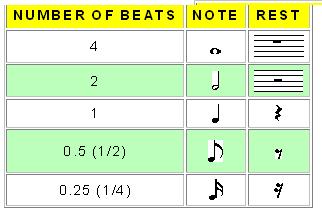Tuesday, May 02, 2006
Lesson-14 : Consolidation of Time Factor!
Hi All,
In fact, today’s posting is mainly to Summarise our understandings (numbered as US-1, 2 etc.) of Time related discussions so far :
US-1 : Sound Level and Time duration of notes are two important aspect of musical notes.
US-2 : Assuming an unit time duration, The following are the various time values of the notes frequently used in score sheets :

Whole Note (Semi-breve) – 4 units – White oval shape note without stem
Half-Note (Minim) - 2 units - White note with vertical stem
Quarter Note (Crotchet) - 1 unit - Black note with a vertical stem
One-Eighth Note (Quaver) – half unit – Crotchet with a tail added at the stem
(further halving of quaver, will halve the unit and represented by additional tails each time)
Similar to the sound, Silence also have time factor and are denoted by appropriate symbols.
US-3 : The actual duration of one unit of time duration is a variable one and determined based on the music, composer’s choice etc.
US -4 : Bar lines shown in a score sheet divide the musical notes into equal time period and this helps in easy grouping of notes and better reading of notes.
US-5 : Each bar will be consisting of notes of various time duration as per song requirement, but the sum-total of notes in each bar will remain the same.
This sum total in a bar may be equal to either 4 units, 3 units or 2 units. (These units may be normally crotchet and sometime other note values are also used . Also, there are some complicated time units also which for the time being we will ignore).
US-6 : Within bar also, notes less than one unit are grouped to make one single unit for better reading.
US-7 : The notes falling on the start of the bar are usually accented (stress is given).
Conversely , this give clue to identify the starting of musical bar and help in analyzing the notes and their time values.
Analyse IR songs as much possible w.r.t time value, bar divisions etc. Nobody is going to give you so much excellent, examples thorough practical lessons and illustrate so clearly like IR ! Utilise this opportunity to the maximum !
With these basic knowledge of Sound and Time, we are on the threshold of crossing the Nursery department of our learning!
My objective is to take you to the High School door steps and leave there for you to survive on your own further !
So Primary department is what we have to cross to reach high school door !
At this juncture, I would leave the “Time” matter as such, and will divert back to expanding our horizon of knowledge again related to the “Sound” Level of notes.
In fact, today’s posting is mainly to Summarise our understandings (numbered as US-1, 2 etc.) of Time related discussions so far :
US-1 : Sound Level and Time duration of notes are two important aspect of musical notes.
US-2 : Assuming an unit time duration, The following are the various time values of the notes frequently used in score sheets :

Whole Note (Semi-breve) – 4 units – White oval shape note without stem
Half-Note (Minim) - 2 units - White note with vertical stem
Quarter Note (Crotchet) - 1 unit - Black note with a vertical stem
One-Eighth Note (Quaver) – half unit – Crotchet with a tail added at the stem
(further halving of quaver, will halve the unit and represented by additional tails each time)
Similar to the sound, Silence also have time factor and are denoted by appropriate symbols.
US-3 : The actual duration of one unit of time duration is a variable one and determined based on the music, composer’s choice etc.
US -4 : Bar lines shown in a score sheet divide the musical notes into equal time period and this helps in easy grouping of notes and better reading of notes.
US-5 : Each bar will be consisting of notes of various time duration as per song requirement, but the sum-total of notes in each bar will remain the same.
This sum total in a bar may be equal to either 4 units, 3 units or 2 units. (These units may be normally crotchet and sometime other note values are also used . Also, there are some complicated time units also which for the time being we will ignore).
US-6 : Within bar also, notes less than one unit are grouped to make one single unit for better reading.
US-7 : The notes falling on the start of the bar are usually accented (stress is given).
Conversely , this give clue to identify the starting of musical bar and help in analyzing the notes and their time values.
Analyse IR songs as much possible w.r.t time value, bar divisions etc. Nobody is going to give you so much excellent, examples thorough practical lessons and illustrate so clearly like IR ! Utilise this opportunity to the maximum !
With these basic knowledge of Sound and Time, we are on the threshold of crossing the Nursery department of our learning!
My objective is to take you to the High School door steps and leave there for you to survive on your own further !
So Primary department is what we have to cross to reach high school door !
At this juncture, I would leave the “Time” matter as such, and will divert back to expanding our horizon of knowledge again related to the “Sound” Level of notes.
